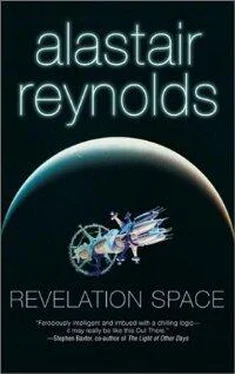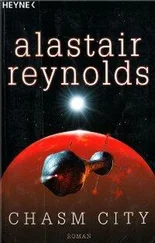In fact, there were two of them, and he wasn’t sure which was the stranger. They were moving, or rather one of them was, locked in orbit around the other. The one that moved was like a gem, but it was a gem so complicated, and so constantly in flux, that it was impossible to describe its shape, or even its colour and lustre from moment to moment. All he knew was that it was large—tens of kilometres wide, it seemed—but again, when he asked the suit to confirm this, it was unable to give him a coherent reply. He might as well have asked the suit to comment on the subtext of a piece of free-form haiku, for all the sense it gave him.
He tried to enlarge it with his eyes’ zoom faculty, but it seemed to defy enlargement, if anything growing smaller when he examined it under magnification. Something seriously strange had happened to spacetime in the vicinity of that jewel.
Next, he tried to record a snapshot of it using his eyes’ image capture facility, but that failed as well, and what the image showed was something paradoxically more blurred than what he appeared to see in realtime, as if the object were changing more rapidly on small timescales—more thoroughly—than on timescales of seconds or longer. He tried to hold this concept in his head and for a moment thought he might have succeeded, but the illusion of understanding was only fleeting.
And the other thing…
The other thing, the stationary thing… if anything, this was worse.
It was like a gash in reality, a gaping hole from which erupted white light from the mouth of infinity. The light was intense, more intense and pure than any he had known or dreamt of—like the light which the near-dead spoke of, beckoning them to the afterlife. He too felt the light was beckoning. It was so bright he should have been blinded. But the more he looked into its fulgent depths, the less it seemed to glare; the more it became only a tranquil, fathomless whiteness.
The light refracted through the orbiting gem, casting varicoloured, constantly shifting slabs of illumination on the chamber walls. It was beautiful; intense and ever-shifting, beguiling.
“At this point,” Calvin said, “I think a little humility may be in order. You’re impressed, aren’t you?”
“Of course.” If he spoke, he did not hear his own words. But Calvin seemed to understand.
“And this is enough, isn’t it? I mean, now you know what it was they had to conceal from us. Something so strange… God only knows what it is…”
“Perhaps that’s just what it is. God.”
“Staring into that light, I almost believe you.”
“You feel it too, is that what you’re saying?”
“I’m not sure what I feel. I’m not sure I like it, either.”
Sylveste said, “Do you think they made this, or was it something they happened to find?”
“This is a first—you asking my opinion.” Calvin seemed to deliberate, but his answer was hardly surprising when it came. “They never made this, Dan. They were clever—maybe even cleverer than us. But the Amarantin were never gods.”
“Someone else, then.”
“Someone I hope we never meet.”
“Then hold your breath, because for all I know, we’re about to.”
Weightless, he jetted the suit into the chamber, towards the dancing jewel and the source of searingly beautiful light.
When Volyova came around, it was to the sound of the radar warning siren, which meant that the Infinity was preparing to re-aim its grasers. It would not take it more than a few seconds to do so, even allowing for her random-walk evasive manoeuvre. She glanced at the hull health indicator and saw that they were down to only a few remaining millimetres of sacrificial metal, that the chaff throwers were depleted, and that—realistically—they could withstand no more than one or two additional bursts of graser-strike.
“Are we still here?” Khouri asked, seemingly astonished that she was even capable of framing the question.
One more strike and the hull would start outgassing in a dozen places, if it did not spontaneously vaporise. It was hot now; noticeably. The heat of the first few sweeps had been efficiently dissipated, but the last one had not been so easily parried, and its lethal warming energies had seeped inwards.
“Get to the spider-room,” Volyova shouted, momentarily throttling down the thrust to permit locomotion around the ship. “The insulation will enable you to survive another few strikes.”
“No!” Khouri was shouting now. “We can’t! At least here we’ve got a chance!”
“She’s right,” Pascale said.
“You’ll still have one in the spider-room,” Volyova said. “Better, in fact. It’s a smaller target, for one. I’m guessing the ship will direct its weapons against the shuttle in preference, or it may not even realise that the spider-room is anything but wreckage.”
“But what about you?”
She was angry now. “Do you think I’m the type to indulge in heroics, Khouri? I’m coming too; with or without you. But I have to program a flight pattern into the shuttle first—unless you think you can do it.”
Khouri hesitated, as if the idea was not totally absurd. Then she unbuckled from her couch, jabbed a thumb towards Pascale and began moving, as if her life depended on it.
Which, rationally, it probably did.
Volyova did what she had promised she would do, inputting the most hair-raising evasive pattern she could imagine, one that she was not even sure she or her companions would be capable of surviving, with peak bursts exceeding fifteen gees for whole seconds. But did it really matter now? Somehow, the idea of dying while already unconscious, in the warm, muggy torpor of gee-induced blackout, was preferable to being burned alive, in vacuum, in the invisible heat of gamma-rays.
Grabbing the helmet she had worn when she boarded the shuttle, she prepared to join the others, mentally counting down until the initiation of the evasive pattern.
Khouri was halfway across to the waiting spider-room when she felt the wave of heat slap across her face, followed by the dreadful sound of the hull giving up its final ghost. The illumination in the cargo bay was gone now, as the Melancholia ’s energy grid collapsed under the onslaught of the attack. But the spider-room’s interior was still powered up, its implausibly plush decor visible through the observation windows.
“Get in!” she shouted to Pascale, and although the noise of the ship’s death-throes was now tremendous, like a concerto played on scrap metal, somehow Sylveste’s wife heard what she said and clambered into the spider-room, just as a tremendous shock wave slammed through the hull (or what remained of it), and the spider-room exploded free of the moorings in which it had been locked by Volyova’s servitors.
Now there was a terrible howl of escaping air from elsewhere in the shuttle, and suddenly Khouri felt it tug against her, resisting her forward progress. The spider-room twisted and turned, its legs thrashing wildly, randomly. She could see Pascale now, in the observation window, but there was nothing the woman could do to help; she understood the room’s controls even less comprehensively than Khouri.
She looked behind, hoping and praying that she would see Volyova there, having followed them, and that she would know what to do, but there was nothing except empty access corridor, and that awful sucking stream of escaping air.
“Ilia…”
The damned fool had done just what they’d feared; stayed behind, for all that she had denied that she would.
With what little light remained, she saw the hull quiver, like a sounding-board. And then suddenly the gale that was pulling her away from the spider-room lost its strength; counter-balanced by an equally fierce decompression halfway across the cargo bay. She looked towards it, eyes already veiling over as the cold hit them, and then she was falling towards the gap where only a second earlier there had been metal—
Читать дальше












